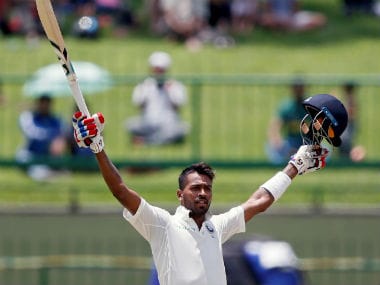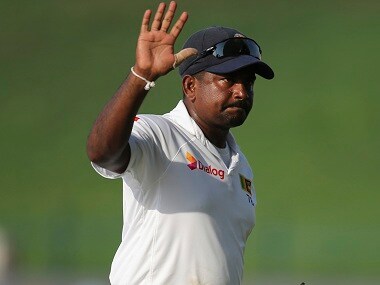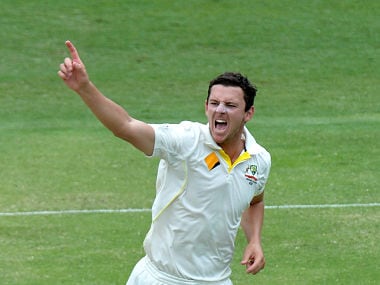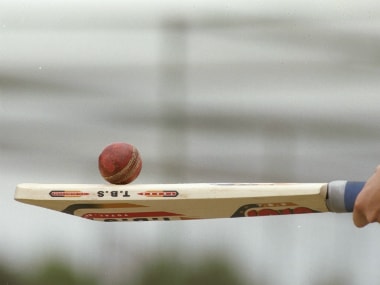Ranji Trophy: From Sachin Tendulkar to Amol Muzumdar, former greats reminisce Mumbai's tales of glory
Former Mumbai skippers Madhav Apte, Sudhir Naik, Dilip Vengsarkar, Sanjay Manjrekar, Sachin Tendulkar and Amol Muzumdar went down the memory line ahead of city's 500th Ranji Trophy match.
Shantanu Srivastava, Nov, 09 2017
- New Zealand in India, 3 T20 International Series, 2017 IND Vs NZ India beat New Zealand by 6 runs
- New Zealand in India, 3 T20 International Series, 2017 IND Vs NZ New Zealand beat India by 40 runs
- New Zealand in India, 3 T20 International Series, 2017 IND Vs NZ India beat New Zealand by 53 runs
- Pakistan and Sri Lanka in UAE, 3 T20 International Series, 2017 PAK Vs SL Pakistan beat Sri Lanka by 36 runs
- Bangladesh in South Africa, 2 T20 International Series, 2017 SA Vs BAN South Africa beat Bangladesh by 83 runs
- Sri Lanka in India, 3 Test Series, 2017 IND vs SL - Nov 16th, 2017, 09:30 AM IST
- The Ashes, 2017/18 AUS vs ENG - Nov 23rd, 2017, 05:30 AM IST
- Sri Lanka in India, 3 Test Series, 2017 IND vs SL - Nov 24th, 2017, 09:30 AM IST
- Papua New Guinea and Scotland in UAE, 2 ODI Series, 2017 PNG vs SCO - Nov 24th, 2017, 04:30 PM IST
- Papua New Guinea and Scotland in UAE, 2 ODI Series, 2017 PNG vs SCO - Nov 25th, 2017, 04:30 PM IST
| Rank | Team | Points | Rating |
|---|---|---|---|
| 1 | India | 4493 | 125 |
| 2 | South Africa | 3767 | 111 |
| 3 | England | 4497 | 105 |
| 4 | New Zealand | 3114 | 97 |
| 5 | Australia | 3294 | 97 |
| Rank | Team | Points | Rating |
|---|---|---|---|
| 1 | South Africa | 6386 | 120 |
| 2 | India | 6379 | 120 |
| 3 | Australia | 5948 | 114 |
| 4 | England | 6156 | 114 |
| 5 | New Zealand | 5432 | 111 |
| Rank | Team | Points | Rating |
|---|---|---|---|
| 1 | Pakistan | 2843 | 124 |
| 2 | New Zealand | 1925 | 120 |
| 3 | West Indies | 2395 | 120 |
| 4 | England | 2029 | 119 |
| 5 | India | 2965 | 119 |





Mumbai: On 7 May 1991, the last day of that year's Ranji Trophy final, Haryana captain Kapil Dev met Dilip Vengsarkar in the Wankhede Stadium restroom, and said, “Ek baar to jeetne de” (Let us win once, at least). The request seemed odd, considering the visitors had set a daunting 355-run target on the final day, but such was Mumbai’s penchant for rising from the dead that Kapil couldn’t help but remain cynical of his team’s chances.
As it turned out, his misgivings came true as Vengsarkar went on a rampage and, in the company of a 17-year-old Sachin Tendulkar, brought Mumbai agonisingly close to pulling off a stunning chase.
Mumbai celebrate their 2015-16 Ranji Trophy win. PTI
The duo united at 34/3, and rather than being bogged down, unfurled an exhibition of delectable strokeplay that caught Haryana off-guard. They fell short by two runs, with the dejected, teary-eyed figure of a 35-year-old Vengsarkar becoming the lasting, lingering memory of that classic.
Sixteen years on, the loss still rankles, and Vengsarkar, on the eve of Mumbai’s 500th Ranji Trophy match, recounted the final in some detail.
“Sachin (Tendulkar) changed the complexion of that game. We needed 45 runs from 10 overs, and we lost by two runs. It was worse than losing Mumbai Cricket Association (MCA) election to Vilasrao Deshmukh,” he told an enraptured audience at a function held to felicitate Mumbai’s former captains.
The gathering was a Ranji aficionado’s delight. Rich odes were paid to city’s illustrious cricket history, and former skippers, from Madhav Apte and Ajit Wadekar to Vengsarkar and Tendulkar, regaled a select audience with their nuggets.
Sanjay Manjrekar, who led Mumbai in that final, recalled how his team grew superstitious on that eventful day.
“It happens with cricketers. That day, nobody moved from their places, because if someone did, something would happen on the field. I was the captain of the team, but I couldn’t see much of Vengsarkar-Tendulkar batting that day. It was the crowd’s roar that told me if a boundary was hit. My memory of that match is through sounds, and not visuals,” he said.
Tendulkar, who was already earmarked for greatness by then, blitzed his way to 96. His most memorable match, however, came nine seasons later in the semi-final against Tamil Nadu, played at the Wankhede Stadium.
“I think we were chasing 485 (in the first innings) and Ashok Mankad was our coach. He kept everyone involved. He had a peculiar way of motivating everyone. He would call Vinod (Kambli) ‘sir’. That was his way of motivating them,” the batting maestro recollected.
“Lot of things happened during that game. At one moment, the ball stopped swinging and Robin Singh kept giving it to the umpires and asked for it to be changed. Finally it got changed and the ball started reversing. I stood two feet outside the crease and I knew some message would go across. Hemang Badani, was fielding at point, told the bowler ‘munnadi’ (Tamil for ‘forward’) and next ball I stood two feet inside the crease.”
“Whatever he kept telling the bowler, I would change. Whenever he said ‘munnadi’, I would go back and vice-versa. Post-match, I told him, by the way, I understand Tamil,” Tendulkar chuckled.
Tendulkar led Mumbai’s charge with an attacking, unbeaten 233, scored at a strike-rate of 69.76, and the hosts eventually secured a narrow five-run lead, reducing the match to an essentially one-inning shootout.
Sachin Tendulkar bats during the Ranji Trophy match against Railways at the Wankhede stadium in Mumbai on November 2, 2012. AFP
“The match was quite evenly poised at one stage, but not just saving wickets but also scoring runs was critical,” he said.
“I think I was batting with Ramesh Powar. Having practiced with him — this is the beauty of practising together — he always liked hitting the ball. I said, 'I will keep telling you why are you playing the ball, but you aren’t supposed to listen.’ The last man was there, Santosh Saxena, and the first ball was a full toss. I said ‘not out’ and the umpire gave not out. It was a coincidence (laughs).”
Powar and Saxena held fort for 25 and 12 balls respectively, allowing Tendulkar to overhaul Tamil Nadu’s first innings’ tally.
“There were still about 165 overs to go in the game. As we know Wankhede’s wicket, on fourth and fifth day, games start moving fast. Ajit (Agarkar) bowled brilliantly and won us the game,” Tendulkar said.
It was, however, a complete bowling performance by Mumbai that day, and Agarkar, Powar, Saxena and Abey Kuruvilla took two wickets apiece to bundle the Robin Singh-led side to 171. Mumbai cantered to an eight-wicket win, with Tendulkar, fittingly, at the crease when the winning runs were scored.
Eleven seasons earlier, the batting genius had announced his Ranji Trophy arrival with a century on debut against Gujarat, making it a first such instance since Apte’s ton in his first Ranji game, against Saurashtra in 1951-52 season.
“I remember the north stand was vocal as usual, (full of) my friends,” the 44-year-old recalled his debut.
“I would like to thank Kiran Mokashe and Suru Nayak. Whenever the nets were over, they would take me out and ask me to pad up and set fields — silly-point, slip and all possible attacking fields. There were occasions that they would request Raju Kulkarni and other fast bowlers to go with me. Without fail, these two would work on my technique. That would give me so
much confidence. They would tell me ‘you need to survive ten minutes,’ and ten minutes would never get over. They would continue bowling to me. That’s why I was well prepared when I played my first game. There were guys at the non-striker’s end. Alan (Sippy) was there, Lalu (Lalchand Rajput) was also there. All these guys gave me confidence. I was only 15 then,” he said.
Tendulkar led Mumbai to Ranji title in 1993-94, and credited his team’s practice methods for their triumph.
“Our practice methods, I thought, were good, but they could be bettered is what I felt. I am of this belief that results invariably follow your preparation, so I focussed more on preparations,” he said.
“I remember Arjun was there, the groundsman. There were a lot of groundsmen with whom I would regularly be in touch with, and I would tell them not to cover the wicket. Bowlers should make our life uncomfortable. Salil (Ankola) was there, Abey (Kuruvilla), Paras (Mhambrey), Manish Patel…so the fast bowling attack was formidable, possibly the best in India. We told them to make our lives miserable and fire away bouncers at will. It made me mentally strong.”
Another Achrekar protégé and Mumbai stalwart, Amol Muzumdar, also remembered his stellar Ranji debut in 1993-94 season. He famously scored a majestic 260 in his first dig, a world record that stands to the day.
An elegant right-hander with a typically insatiable appetite for tall scores, Muzumdar got his chance in the pre-quarterfinal against Haryana in Faridabad as Sanjay Manjrekar, Sachin Tendulkar, Vinod Kambli and Salil Ankola had left for national duty in New Zealand.
Muzumdar knew he had to make his chance count.
“I knew for a fact that if I let go of this chance, I will not get another chance,” he said.
“After getting my hundred, I kept reminding myself to score big so that I can keep my place when these stalwarts come back. Eventually, it so happened that I got few runs”
Muzumdar was handed Mumbai’s full-time captaincy in the 2006-07 season, and he responded with the title after overcoming an atrocious start to the campaign.
The start, as Muzumdar put it, was a “nightmare” as Mumbai failed to get a single point after first three games. With the threat of relegation looming, Muzumdar rallied his men to fashion a rare rearguard.
“After the third loss, some harsh words were said in the dressing room. I was the one who spoke my heart out, because I didn’t like the way we had played till then. Another thing that triggered that harsh talk was that Hyderabad celebrated with champagne on the boundary-line as they needed about 20 runs to win. But what really turned things was when we were at the Hyderabad airport lounge.”
“We were sitting at arm’s length, but nobody talked to each other. Our heads were down. And then some encouraging SMSes were sent. We didn’t speak a word to each other, but everybody received those messages, and that’s when the turnaround happened.”
Mumbai roared back with innings’ wins over Gujarat, Rajasthan and Maharashtra, but lost half their side without a run on the board in their second innings.
“We scored 235 in first innings, and since I batted the whole day, I knew for a fact that it was worth 400 on that wicket. It turned out to be that way, as for the next three days, the average score was 100. Vinayak Samant played one of the most extraordinary innings, and we went to win not just the semi-final, but the final,” he said.
Also present on the occasion were Madhav Apte, Sudhir Naik, Ajit Agarkar, Vinod Kambli and Baroda and Mumbai teams that will square off for the iconic match at the Wankhede Stadium on Thursday.
Published Date:Nov 09, 2017
| Updated Date: Nov 09, 2017
Also See
Ranji Trophy: Sachin Tendulkar recalls 1999-00 semi-final against Tamil Nadu as most memorable, before Mumbai's 500th match
Ranji Trophy: Record-breaking Mumbai set to add another feather to cap with 500th match in tournament
Ranji Trophy: Unstoppable Prithvi Shaw makes India sit up and take notice with fourth ton in five games